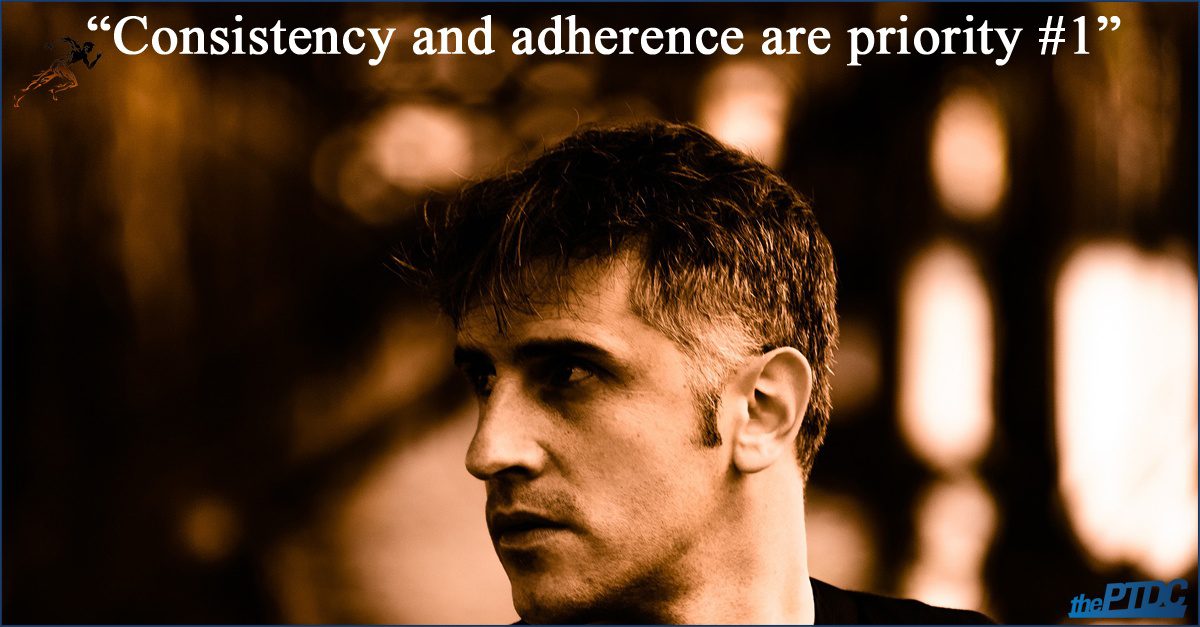I'll let you argue about what's optimal. I like that stuff too.
But the reality is that we see people get results with many methodologies from CrossFit to Bodybuilding to TRX classes. Even Zumba has "worked" for people.
As trainers, let's just agree that gen pop weight loss clients should be doing compound lifts and compound bodyweight exercises.
Extra cardio, suspension training, kettlebells, and all the gizmos and gadgets don't individually matter, but are an important part of the bigger picture:
Client Adherence is Everything
What really matters is if a person will do the exercises and do them consistently.
I love kettlebells, but they aren't a requirement to any program. If you have a client who hates them, you can find better alternatives. If you have a client who thinks they're cooler than a Colorado winter, you should program them in even more.
Ultimately, as a trainer, your "style" should be adaptable to the client.
The Single Most Important Factor Is Behavior Change
Clients can lose weight with any of the following:
- Paleo
- Weight Watchers
- Vegan (well, some CPTs follow that)
- Gluten Free (this hurts to type)
Why do people have success with things that we know to be non-optimal fad diets?
While you might quickly claim the caloric deficit, I'll challenge you to think differently - it's behavior change.
When people make an extreme switch to one of these diets (since many do before they even meet us), they're making a drastic mental change in saying, "It's time to get serious."
They could be doing it for their looks. They could be doing it for their health. For whatever reason they're in action, something struck a nerve that's making them take this very seriously.
Your job as a trainer is to educate them on nutrition, but again, consistency and adherence are priority #1.

As long as they aren't doing anything dangerous to achieve their goals - the 500-calorie HCG diet comes to mind - your job is to teach them sustainable skills.
Below are three ways that I've been able to motivate clients to change their behavior quickly. If they don't, I know they won't see any results and they'll leave.
3 Ways to Motivate Clients to Change Their Behaviour
1) Simplified Nutrition
Regardless of what nutrition plan they follow, they should understand WHY it will or won't work. Since many female clients come to me eating about 40-60 grams of protein/day (and that's my primary population), I increase that for almost everyone. Basically I teach them to get enough protein. While part of it is for the "power" of protein, a large part of it is the client's satiety.
If they can control their hunger they will be successful.
Other than that I just tell them to add veggies to at least 1 or 2 meals/day, and keep their calories to our set level. That's it. I might fine-tune things over time, but only when they ask and they're ready.
Related Reading (click to open in a new window to read after):
--> Help! My Personal Training Clients Won't Follow Their Nutrition Plans
2) Strength Goals
Usually nutrition is the toughest thing for a client to change (especially if they have a family and young kids that always eat together).
While I hate to jot down most workouts, day 1 is always important. This is where I take detailed notes about their strength, endurance, limitations in ROM, etc.
The primary reason is to take their focus away from the scale. If they aren't very diligent about nutrition at first, you can point out obvious improvements in strength for them.
If you're successful in either increasing weight by a few pounds or an exercise by a few reps, it's not long before the client realizes that they're on to something good.
Whether they know it or not, everyone likes getting strong. Everyone likes feeling a few muscles while they're sitting at their desk.
Help them understand that progress can be made in more way than one, but that both of these areas will help them reach their goal sooner.
Related Reading (click to open in a new window and read after)
-> It's Time to Finally Convince Your Cients That a Scale Doesn't Matter
3) Take Home Assignments
Don't be afraid to share other people's work. I share popular articles about what macros are/how to count them, and YouTube videos or podcasts to help my clients learn each week.
I've even had clients say they appreciate me sharing other people's stuff because it gives them multiple voices to learn from. It would be a bit odd if everything you shared were stuff you wrote.
A primary reason is to keep them learning because the more knowledgeable they are, the more they'll feel in control of their own destiny.
Once the client realizes how much control they have, their confidence tends to skyrocket as they stress less about small hiccups during the week.
Some cool concepts I use include:
Activity 1: Writing a letter to yourself from one month in the future.
Let the future client write about everything they accomplished in the past month, and you'll find that they often have very appropriate and honest goals.
It's also easier for them to open up alone on pen and paper after some soul searching, compared to an uncomfortable environment (the gym) with a new personal trainer staring them down.
Their ability to adhere will increase.
Activity 2: Letter to Themselves
If you have a client that always beats themselves up over little things, have them write at least one thing/day where they feel they made an improvement. It doesn't even have to be fitness related.
People often beat themselves up for every mistake they make throughout a day. They can be so focused on what they did wrong that they fail to see the bigger picture.
This works well with a lot of emotional binge eaters. These clients may eat for comfort if they get yelled at during work, they may feast to celebrate a promotion, and they may eat that whole pizza because "fuck it I already had one slice."
The last part frankly is part of why I keep nutrition basic. You have to drive home that there are no off limit foods -- just certain foods will increase their caloric intake a lot quicker and leave them craving more.
Activity 3: Monthly Strength Check-ins
Progress needs to be multi-dimensional. This is especially true for women who could be holding more water or having incredible cravings depending on where they're at in their menstrual cycle.
One of my clients right now has a goal of completing one handstand push-up. While there's nothing magical about a handstand push-up, it's special in her mind and her success with that will increase her chances of success in every other area we're improving upon together.
It also increases her trust in me each time we hit another goal, and your clients will build the same trust with you.











